by Aaron Wytze Wilson
語言:
English
AS NEWS REPORTS and analysis of the Ma-Xi meeting were flooding news networks around the world, a story about the loss of freedom of speech for one Taiwanese law scholar was being shared wildly on Taiwanese Facebook feeds.
A column published on Taiwan’s Commonwealth Magazine’s Opinion web page written by Cheng-yi Huang (黃丞儀) was taken down by site administrators, citing a need for society to “strictly and fully understand the Ma-Xi meeting”.
Commonwealth apologized to Huang for taking down the post, but offered no specific explanation on why the content was deemed inappropriate. Huang’s article was subsequently reposted on Taiwan’s Apple Daily, The Chinese edition of Thinking Taiwan (想想台灣), and Civil Media (公民行動影音紀錄資料庫).
Huang is associate professor at Academia Sinica’s Institute of Law.
Huang’s article, titled “The Legislative Yuan should impeach the President immediately”, offered a scathing critique of Ma’s plan to meet with China President Xi Jinping without first briefing Taiwan’s Legislative Yuan about the matter. Huang went on to question the constitutionality of such a move, and advised Taiwanese legislators to begin impeachment proceedings in order to stop Ma from going through with the meeting.
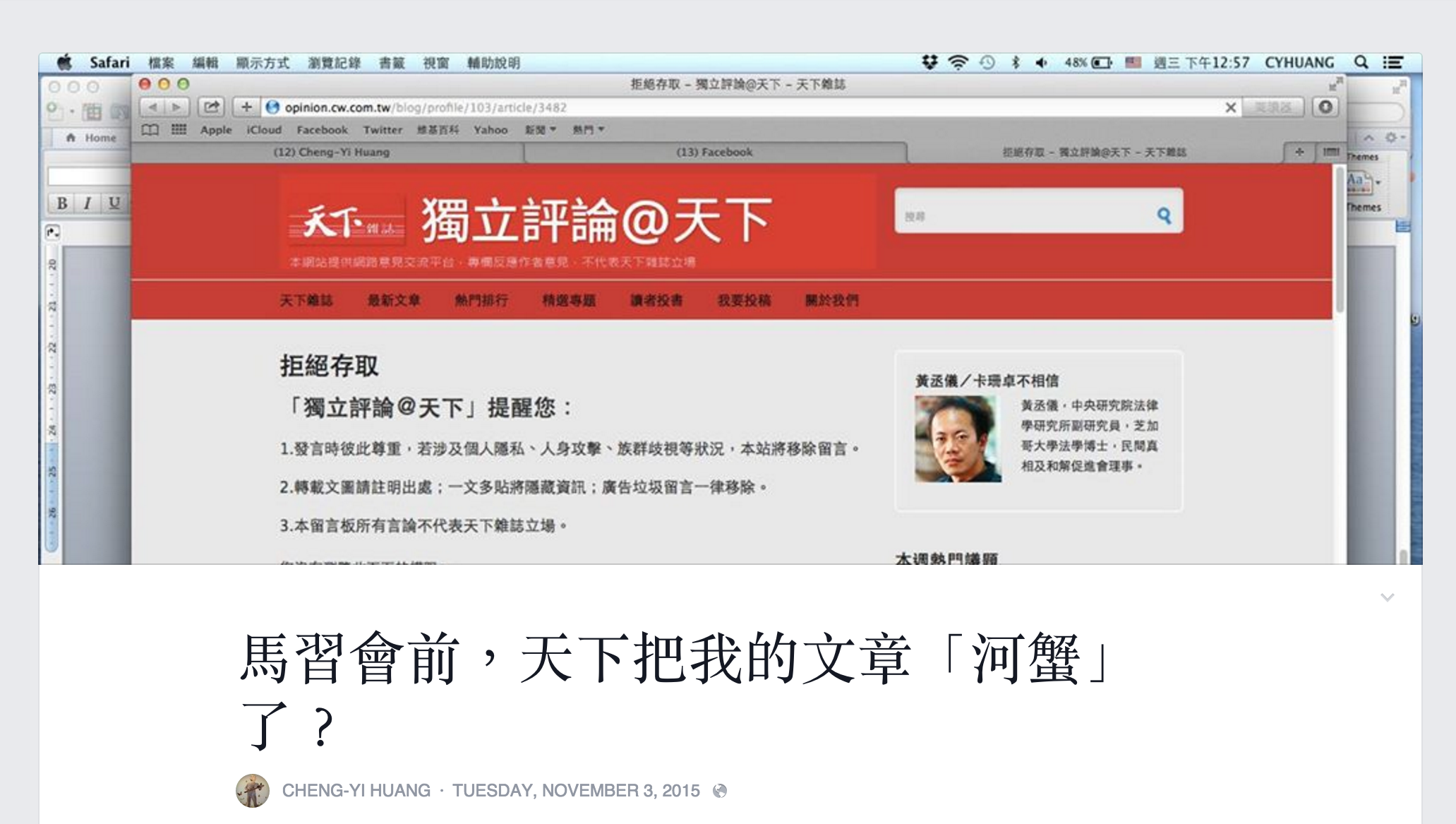 Huang’s demand for an explanation, as posted on Facebook
Huang’s demand for an explanation, as posted on Facebook
Shortly after the news broke that the article was taken down by Commonwealth’s site administrators, Huang’s article and subsequent posting of a demand for an explanation of the take down were shared wildly on Facebook. Many netizens expressed outrage that Commonwealth’s opinion web page would resort to self-censorship on the Ma-Xi meeting, and said the takedown was a blow to freedom of speech in Taiwan.
“What kind of apology is this?” said Anna Tseng. “They should change the name of the site from opinion@commonwealth to censored discussion@commonwealth.”
In response to the takedown by Commonwealth, many of the site’s columnists have stated they will no longer post on the site, and demanded all content previously posted on opinion@commonwealth be removed. “I do not respect Commonwealth’s way of dealing with this issue” said author Chuanfen Chang (張娟芬) “I ask all my content, my name, and photo be taken down from the site.”
“The Ma-Xi meeting hasn’t even begun, and the first casualty has already arrived: freedom of speech” said Academia Sinica researcher Wu Jieh-min (吳介民). Wu also asked for all his content to be taken down from Commonwealth’s website.
Huang’s response to the censorship of his article, and the full text of the censored article can be found below.
Huang’s Facebook post confronting Commonwealth’s censorship:
Before the Ma-Xi Summit, Did Commonwealth Magazine “Harmonize” my Article?
Cheng-Yi Huang
語言:
English ///中文
Translation: Aaron Wytze Wilson
BECAUSE A LOT of my friends have asked me, how come we can’t see your article “Should the Legislative Yuan promptly impeach Ma Ying-jeou?” on “Opinions@Commonwealth”, I simply had to make an explanation.
I’ve been writing commentary pieces every once and while for “Opinions@Commonwealth” since about February 2013. Up until now, I’ve only written about 13 pieces (including my post that was “harmonized” this morning). In fact, it’s really not that many.
When Commonwealth Magazine’s editor-in-chief Ho Jung-hsin (何榮幸) invited me to start this column, he said he absolutely would not intervene in any of the content I wrote. Because I trusted Ho’s reputation in working with news media, I gladly accepted his offer.
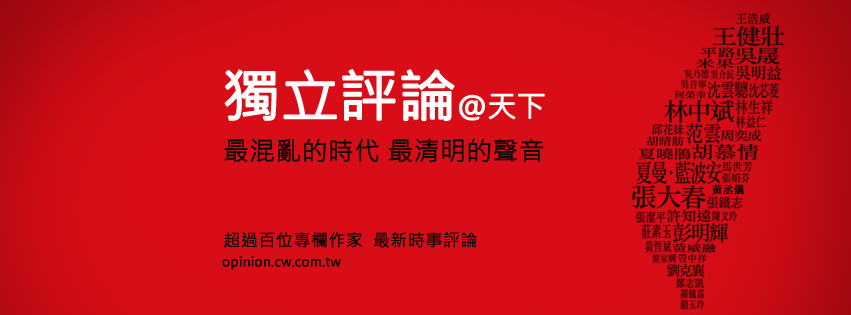 Commonwealth Magazine banner. Photo credit:獨立評論在天下
Commonwealth Magazine banner. Photo credit:獨立評論在天下
Since Ho left Commonwealth Magazine in the middle of this year, I have not written any articles. But after hearing yesterday night about the Ma-Xi meeting on the news, I felt the constitutionality of such a meeting required clarification. So I sacrificed a little bit of sleep time, hastily wrote an opinion piece about the issue, and promptly handed it in to Commonwealth’s new opinions page editor-in-chief Li Ming-hsuan (李明軒).
Before I handed in my copy, I told Ming-hsuan about what the opinion piece is about. He was very courteous, said he would wait for me, and said to send it to him as soon as it’s finished.
This morning when I got up out of bed, I discovered that it wasn’t online. I sent an email to ask if the post would be able to appear before 8 AM, because according to media reports, the Premier of the Executive Yuan was appearing at the Legislative Yuan to make a report about President Ma’s visit. Many citizen groups were also making their way down to the Legislative Yuan to protest before 9 AM.
Editors at the opinion page are always very efficient in publishing articles before 8 AM. I put the link to the article on my own Facebook page and invited friends to give their opinions.
Up to this point, the process of posting an article was as usual, calm and easy. After finishing, I went downstairs to exercise, and ate breakfast. When I got home, ready to begin work, I found that my assistant had sent me a message: The editor at the opinions page was urgently looking for me. I thought, what was going on?
At the same time, I received a message from the opinions editor, a brief message that only said: “Currently, the article is not online, mainly because there is a high level of anxiety that readers will mistake the opinions expressed in the article to be those of Commonwealth. I just got in touch with your office and hoped to explain the situation.”
Afterwards, I opened my computer to find many messages from friends asking me, why couldn’t they see the article?
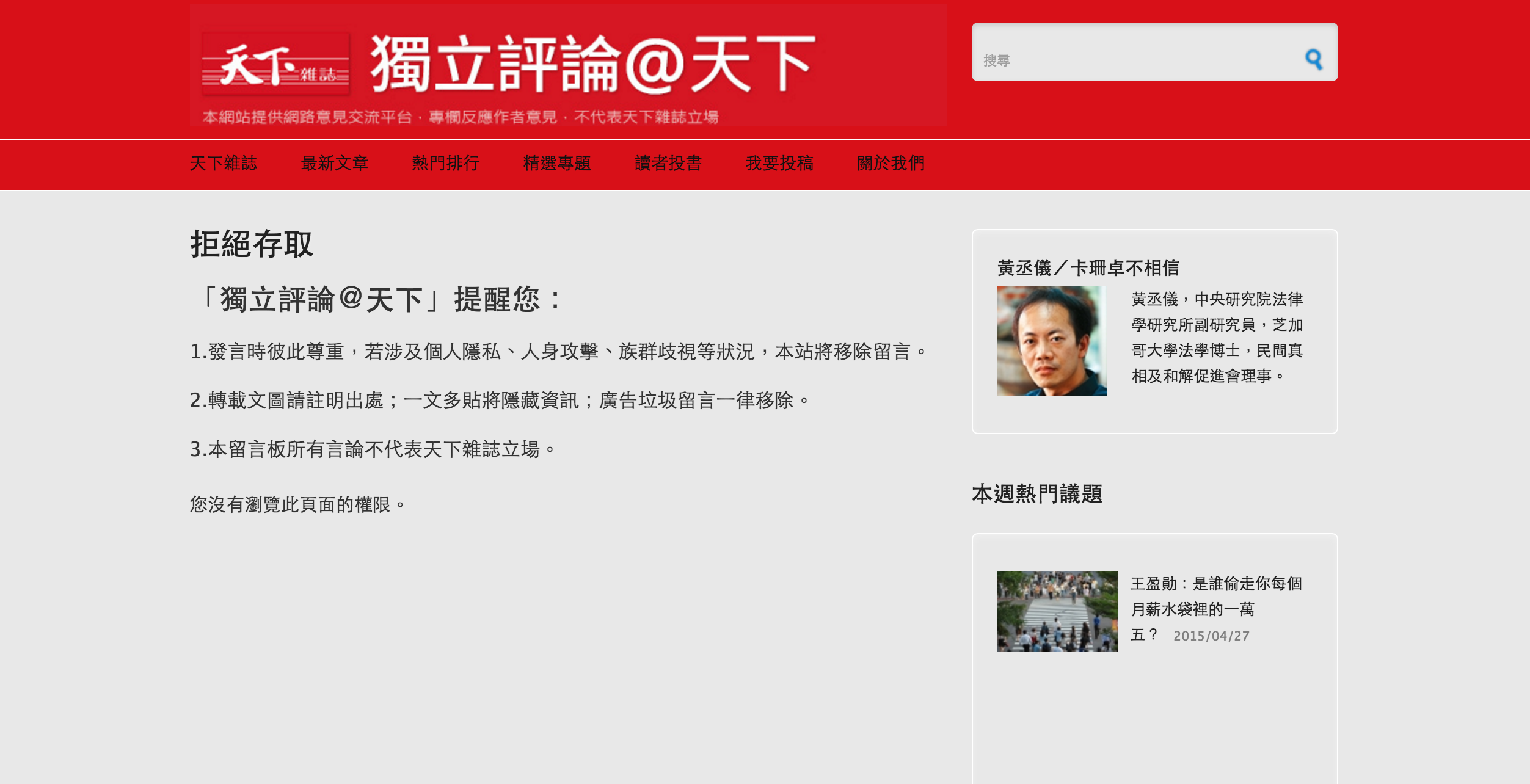 Cheng’s account on Commonwealth
Cheng’s account on Commonwealth
I believe it was very clear from the beginning that Commonwealth’s opinions page site is a platform to submit free opinions. It even says so at the bottom of the website: “This website is a platform to exchange ideas. The views expressed are those of the author and not reflective of Commonwealth Magazine’s viewpoint.”
Similar words appear at the bottom of every special column: “This column is a place to exchange views online. The views are those of the columnist and are not reflective of Commonwealth Magazine’s viewpoint.” Isn’t this already clear enough?
If they are worried that the opinions published will be wrongfully construed as those of Commonwealth Magazine’s, then Commonwealth should just get rid of their free opinion webpage. Originally, did Commonwealth only publish free opinion articles it agreed with? Or is this just an excuse? Is it actually that Commonwealth has a high-level of disapproval for this kind of free opinion content?
When working in media, whether it’s print or online, respecting freedom of speech should be our most basic right. Media people do not show respect for freedom of speech when they take down content without the author’s consent. They lose credibility as a news organization and also trample on the rights of the author.
After learning about this issue, I wrote an email to Opinion@Commonwealth’s editor group, expressing my extreme disapproval of this issue, and hoped they would recover the article to be posted online before 11am. I stated that otherwise, I would consider “opening up this issue to the public and prepare to take legal actions against the company for violating my human rights. Henceforth, I will not be offering my articles to Opinions@Commonwealth. I entreat you to pass this onto the higher levels of your company.”
Afterwards they said this issue will have to wait until the completion of the afternoon meeting to be resolved, and that they hoped I would give them a little time. I thought, you didn’t have to wait for the author to take down the article, but you need a meeting to decide to put it back up? What in god’s name is wrong with my article that it deserves this kind of treatment?
After sending my message, I, at most, waited until 11:10 AM. This isn’t an issue of media principles, but a legal question. I didn’t plan to sue the company, but I at the very least had to be clear about my rights.
I still received no message after 11:10 AM. However, one of the editors who contacted my assistant by phone said they hoped to communicate by phone. Wouldn’t it be better if it were done that way from the beginning? But if the article is already taken down, what’s left to talk about? This morning I had a number of outstanding papers to hand in, so I asked them to directly send me an explanation by email. I never received anything after that. I imagined they wouldn’t be changing their decision.
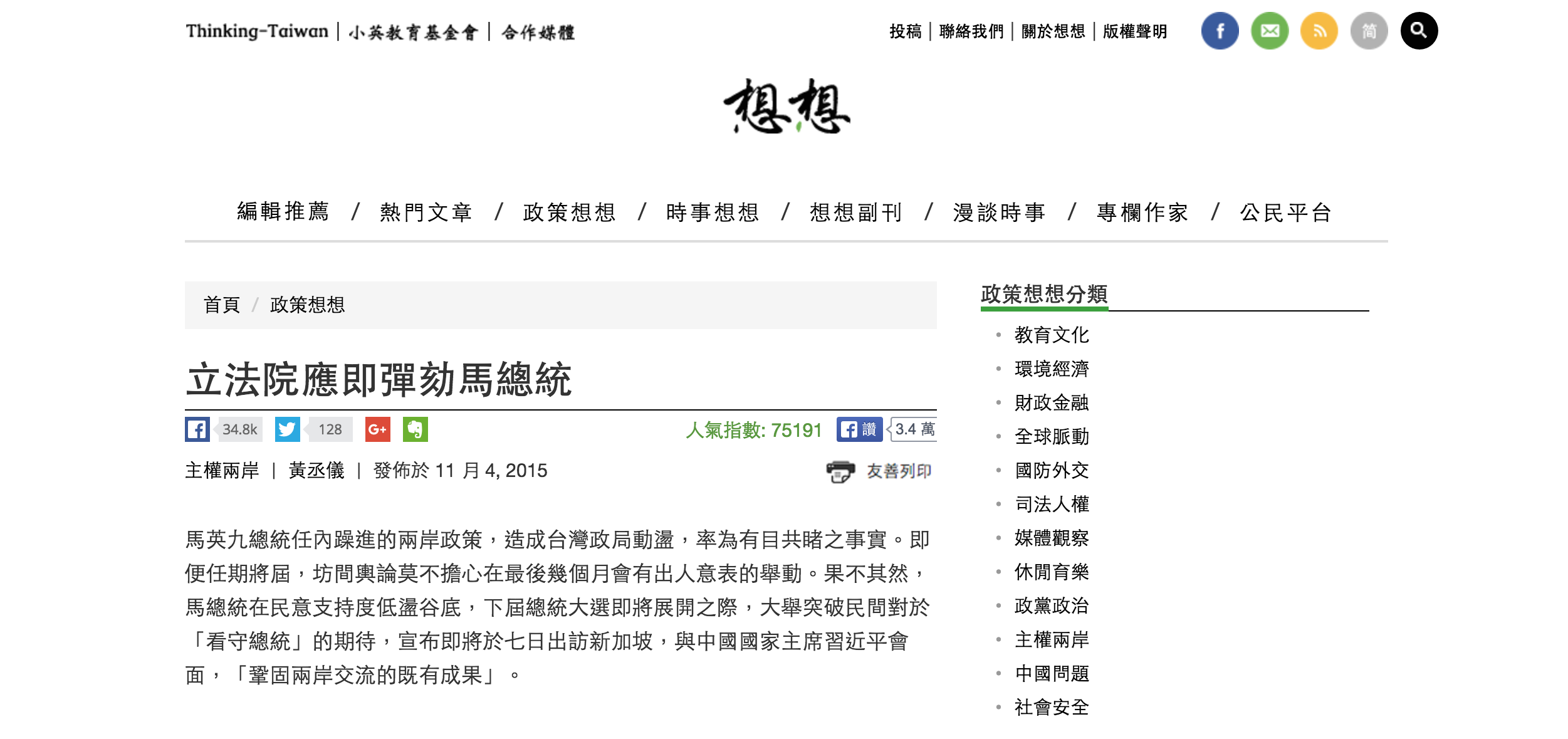 Cheng’s article as posted on Thinking Taiwan
Cheng’s article as posted on Thinking Taiwan
At this moment, Thinking Taiwan (想想台灣), Civil Media (公民行動影音紀錄資庫), and Apple Daily’s Real Time News Forum are willing to publish my article, with Thinking Taiwan taking the lead in publishing the original.
Frankly speaking, my article only represents my personal opinions, if you don’t agree, we can debate it or discuss it; I might have written something wrong or I might have a narrow point of view in some places.
But not tolerating any discussion whatsoever and directly taking down the article is not only surprising to people, but also a principle that most people are totally unwilling to accept.
Are you telling me that the media has to be considerate of the feelings of the ruling party or leader before it publishes? What kind of freedom of press would the media have in this situation?
Commonwealth Magazine brags that it is a top-quality news media organization, but if the high-ups interfere in the editing process of the free opinion editor room by writing off an author’s freedom of expression, then that’s an extremely regretful action.
Taiwanese media has already lost the China Times and, as the Ma-Xi meeting approaches, is Commonwealth also planning to forfeit its media credentials? This makes everyone very pessimistic about the future.
If anyone still has interest in seeing what kind of article would force Commonwealth Magazine to “harmonize” it’s content, it can be viewed at the links below.
想想論壇:http://www.thinkingtaiwan.com/content/4782
公庫:http://www.civilmedia.tw/archives/38776
Huang’s Censored Article:
The Legislative Yuan Should Impeach President Ma Immediately
Cheng-Yi Huang
語言:
English /// 中文
Translation: Aaron Wytze Wilson
THE CROSS-STRAIT policy President Ma Ying-jeou has anxiously pushed ahead has brought about political turmoil in Taiwan. This fact should be obvious to all. Even though this is Ma’s final term, there is no one who is not worried that in the final months of his term, an unexpected turn of events might occur.
Perhaps unsurprisingly, then, President Ma, with his popularity levels at an all-time low—and just before the next presidential election is about to begin—has announced that that he will travel to Singapore on the 7th and meet with Chinese Communist Party chairman Xi Jinping in an effort to consolidate existing cross-strait exchange achievements.
Based on what President Ma feels to be his historical mission, Ma intends to be the one written down in history as the leader who “broke the ice” of cross-strait relations, and finally meet with China. These are the political values he chooses, I can understand.
 Ma Ying-Jeou. Photo credit: WikiCommons
Ma Ying-Jeou. Photo credit: WikiCommons
But just as before, in previous years, dissenting voices again and again have sincerely advised Ma that because the president is not an individual but an organ of constitutional government, every act and every move must accord with the constitution’s specific requirements. President Ma should remember when he assumed office, that he swore an oath according to Article 48 of the Constitution:
“I do solemnly and sincerely swear, before the people of the whole country, that I will observe the Constitution, faithfully perform my duties, promote the welfare of the people, safeguard the security of the State, and will in no way betray the people’s trust. Should I break my oath, I shall be willing to submit myself to severe punishment by the State. This is my solemn oath.”
The phrases, “Observe the Constitution, faithfully perform my duties,” are not to be said lightly. “Should I break my oath, I shall be willing to submit myself to severe punishment by the State,” are not mere words one recites.
It begs to be asked: Can the president secretly make deals with the other side of the strait? Can the president decide by himself to meet with the highest leader from the opposite side of the strait without following any constitutional procedures? Or is this the President’s personal sightseeing tour itinerary?
It is written very clearly in the constitution, only the Legislative Yuan has the power to pass a resolution related to “important matters of State”. The Executive Yuan must also pass important matters of state through the Legislative Yuan beforehand. Although the revised amendment allows for the Executive Yuan to pass a resolution when the Legislative Yuan disagrees, Article 63 still stipulates that it is the Legislative Yuan that has “the power to pass bills on laws, budgets, martial law, amnesty, declaration of war, conclusion of peace, treaties, and other important matters of State.”
The powers accorded to the Legislative Yuan are clearly stated in Article 17 of the “Law Governing the Legislative Yuan`s Power”: In the event of an important matter of State taking place, or changes in political administration, the Premier of the Executive Yuan or the related heads of ministries should make a report to the Legislative Yuan and prepare for questioning.”
This report and questioning is not what is happening today. The President has already decided to go to China, and the date has already been set. The Premier and the President’s Secretary-General will go to the Legislative Yuan, get a scolding, listen to some trifles, and be on their way.
In 2001, when Taiwan’s Grand Justice was attending to Chen Shui-bian’s plan to stop the construction of the fourth nuclear power plant (四核), Judicial Interpretation 520 was issued to clarify the relationship between the Executive Yuan and the Legislative Yuan. The ruling recognized that: “In dealing with changes due to the occurrence of a major event or change of policy orientation, statutory amendments must be submitted to the Legislative Yuan for those circumstances that require modification of laws. Matters that require modifications or the implementation of new regulations must be promulgated and be submitted to the Legislative Yuan for review.”
For example, if the premier of the Executive Yuan resigns, the President of the Legislative Yuan must pass a motion of non-confidence. If the motion passes, the Executive Yuan can petition the President to dissolve congress. The Grand Justice said this is “one common path in resolving major political conflicts under the system of democratic representation.”
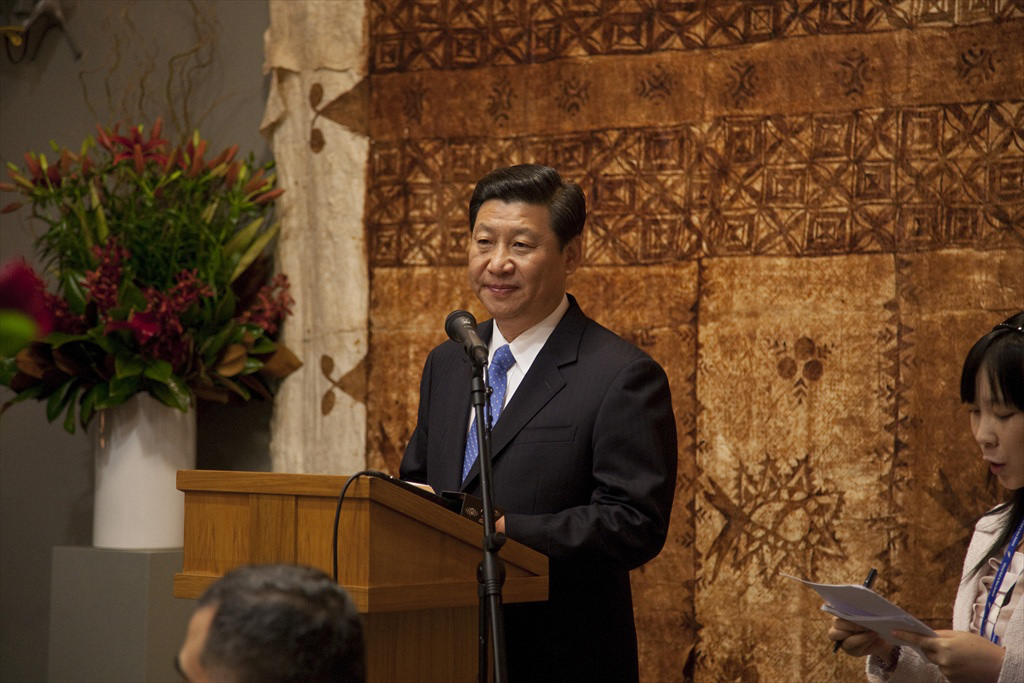 Xi Jinping. Photo credit: Day Donaldson/Flickr
Xi Jinping. Photo credit: Day Donaldson/Flickr
The meeting between the President of the Republic of China and the Chairman of the People’s Republic of China is an unprecedented event that has not occurred since the political turmoil of 1949. Furthermore, this represents the president’s ability to exercise a high level of sovereign power.
If even relatively low level political conduct like opening trade relations and direct flights requires compliance with Article 95 of the “Act Governing Relations between the People of the Taiwan Area and the Mainland Area”, which states: “Changes should be passed by a resolution in the Legislative Yuan”, then shouldn’t political exchanges between the two highest leaders of the cross-straits also be subject to a resolution?
Don’t tell me that this does not belong to the constitution’s standard practice on important matters to the State. Shouldn’t we abide by the constitution’s stipulations that the Executive Yuan decides the matter through a resolution in a meeting, then re-introduces the resolution to the Legislative Yuan, and waits for a majority of legislators to support the bill? Shouldn’t we look to fulfill the principles of responsible democratic governance?
From the information we know thus far, the president has not notified the Executive Yuan to discuss this important matter of state, or even decided on a resolution concerning the issue (if they actually have done so, please disclose the meeting minutes recording forthwith).
The legislature’s power to participate in the decision making progress is a sham and exists in name only. The premier of the Executive Yuan and the President’s Secretary-General are only called on to make their reports when a policy is already ready to be passed. Taiwan’s Legislative Yuan can basically be seen as a rubber-stamp legislature.
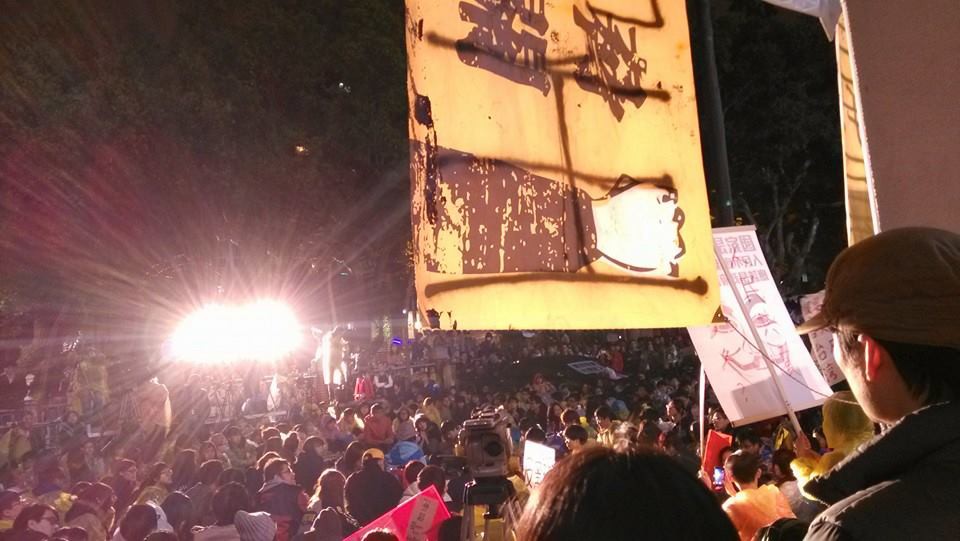 The occupied Legislative Yuan during Sunflower Movement.Photo credit: Brian Hioe
The occupied Legislative Yuan during Sunflower Movement.Photo credit: Brian Hioe
This behavior was already on display during the passing of the CSSTA (服貿), which led to massive protests and the occupation of the Legislative Yuan. But President Ma didn’t take any of this the slightest bit seriously; he has continued to ignore advice and treat the constitution as a mere formality. Violations related to “important matters of State” must comply with the constitution’s procedures.
President Ma’s reckless political behavior has already violated his pledge of “observ[ing] the constitution [and] faithfully perform[ing] my duties”, and has reached the level where impeachment proceedings should take place.
According to the amended changes of Article 4, as long as more than half of legislators make a proposal for impeachment and more than two-thirds of legislators agree to the motion, and then a formal request can be made to the Grand Justice of the Judicial Yuan to hear a case for impeachment.
Although no one currently has high expectations of the Grand Justice of the Judicial Yuan, the entire sum is still equal to President Ma’s nomination. But an impeachment proceeding in itself is a weighty political message. During the hearing of such a case, the president will have to stop doing whatever behavior is the cause of the impeachment motion, in order to ensure that no further irreparable harm is being done. So the crux of the issue lies in the ability of the Legislative Yuan to immediately put forward a motion to impeach the President.
The distance to the next legislative election is less than a hundred days; in regards to whether or not representatives of the Legislative Yuan stand for the popular will of the Taiwanese people we should look to this moment. If legislators are fighting to serve another term in office, legislators should reflect popular opinion; there’s no need to listen to the Premier of the Executive Yuan’s report, it’s all just a meaningless trifle and a waste of time anyways. Legislators should draw up a plan for impeachment and send a warning message. Even if some legislators decide not to fight for re-election, the people of Taiwan can offer an additional punishment to the KMT by not choosing them in the party-list vote.
Ma Ying-jeou seeks momentary satisfaction. And his self-serving attitude brings high political risks. Ma may become the first impeached president in the Republic of China’s history and also may thoroughly destroy the party he once chaired, the KMT. Ma should be willing to “submit” himself to “severe punishment by the State.” Violations of oaths have consequences.




 Cheng’s account on Commonwealth
Cheng’s account on Commonwealth Cheng’s article as posted on Thinking Taiwan
Cheng’s article as posted on Thinking Taiwan

